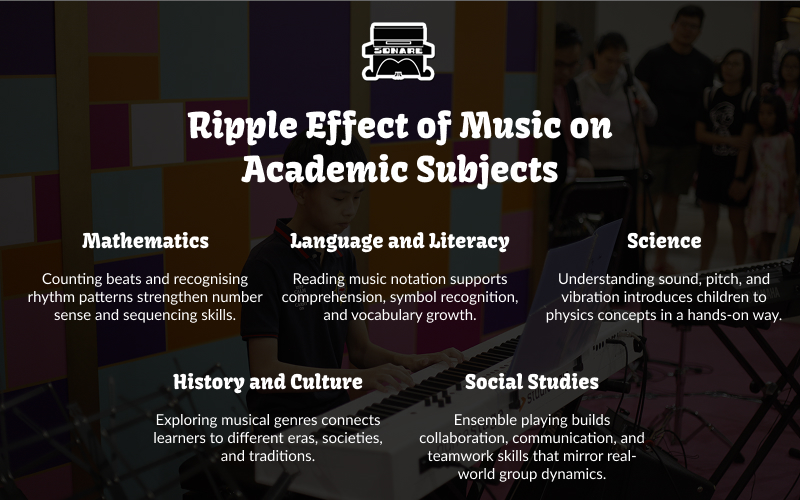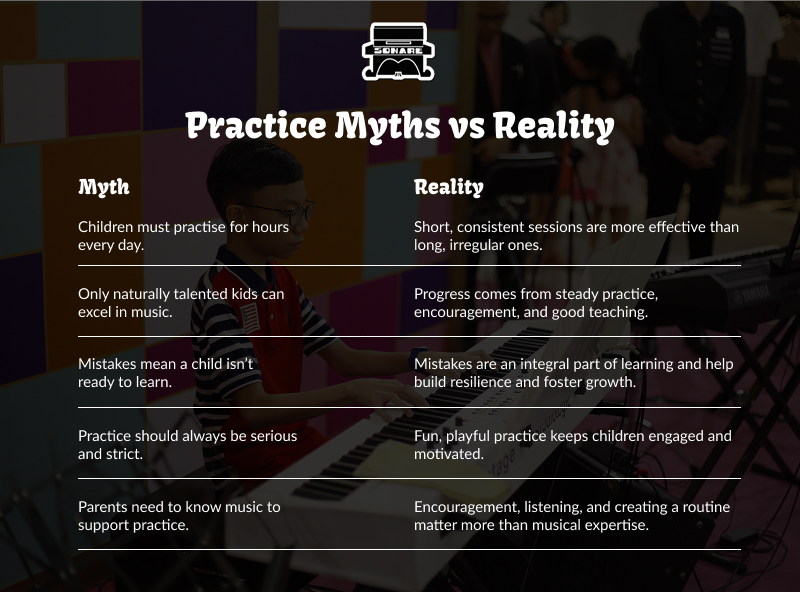The Benefits of Learning Music in Today’s Digital Age
Introduction
In today’s world of constant notifications, busy schedules, and digital distractions, many parents wonder how to nurture creativity and focus on their children. Amid all the noise, music offers something timeless. It gives children a chance to slow down, listen, and express themselves. More than just another extracurricular activity, music provides a space where young learners can grow not only as students but also as individuals.
The benefits of learning music are numerous and far-reaching. In an education system where academics occupy a significant portion of a child’s time, music brings equilibrium to their routine. It supports learning while creating room for creativity and self-expression. It strengthens memory, builds confidence, and fosters resilience. It also gives children a meaningful outlet for their emotions. For many, the simple act of picking up an instrument or attending a class becomes a source of joy, connection, and well-being.
In today’s digital age, the benefits of learning music extend far beyond mastering notes or preparing for exams. Music equips children with qualities that support them throughout life, both in school and beyond. To understand how this occurs, let’s examine the key ways music enhances the mind, fosters emotional growth, and cultivates social connections that remain valuable throughout every stage of learning.
Key Takeaways:
- Music supports both academic and emotional growth, helping children build focus, resilience, and creativity.
- Learning an instrument or joining group classes encourages empathy, teamwork, and cultural appreciation.
- Structured lessons and after-school programmes provide a healthy balance to Singapore’s academically driven environment.
- Every learner, whether a child or an adult, can find joy and confidence through exploring music in a supportive environment.
Key Benefits of Learning Music for Children in the Digital Age
The benefits of learning music extend far beyond the ability to play an instrument. For children growing up surrounded by digital distractions, music offers a steadying influence that strengthens the mind, nurtures emotional well-being, and builds meaningful connections with others. From supporting academic growth to sparking creativity and fostering cultural appreciation, music equips young learners with life skills that carry them well beyond the classroom.
Enhances Cognitive Development and Academic Performance
The benefits of learning music are closely connected to healthy brain development. When children practise an instrument, they are not only memorising notes but also strengthening their memory, attention span, and concentration. Research has shown that children who take part in structured music lessons often develop stronger skills in mathematics and reading comprehension. Musical training engages rhythm, melody, and timing, all of which activate areas of the brain responsible for problem-solving and spatial awareness.
In Singapore, where academic achievement is often a significant focus for families, music provides balance by supporting both school performance and overall growth. Studies continue to highlight a strong link between music and cognitive development in children, particularly when lessons begin early. Beyond improving test scores, the benefits of learning music include nurturing curiosity, discipline, and a love of learning that extends well beyond the classroom.

Encourages Emotional Intelligence and Mental Well-being
One of the most meaningful benefits of learning music is the way it nurtures emotional growth. Children may not always have the vocabulary to express what they are feeling, but music provides them with another means of expression. Playing an instrument, singing, or even moving to rhythm allows them to process emotions in a safe and creative way. This process helps them build emotional awareness while also creating a sense of release, calm, and comfort that supports their overall well-being.
Beyond expression, music instils values that extend far beyond the classroom. Discipline develops through daily practice, patience is strengthened as children progress step by step, and perseverance grows each time they overcome a challenging piece. These life lessons shape character as much as they shape musicianship. For children who participate in music appreciation classes or join ensembles, the learning experience also extends into relationships. Working with peers teaches empathy, cooperation, and respect for different perspectives, while public performances build confidence and pride in their abilities.
In Singapore’s high-pressure academic environment, the benefits of learning music take on even greater importance. Music becomes more than just a skill; it provides children with a supportive space to manage stress, regulate their emotions, and find balance in their daily routines. By offering both structure and freedom, music helps them grow into resilient individuals who can navigate challenges with creativity and confidence.
Builds Social Skills and Cultural Awareness
Music is rarely a solitary pursuit. Group lessons, duets, and school performances all call for collaboration, teaching children to listen, share, and communicate effectively. For many, joining after-school music programmes also means developing teamwork and problem-solving skills that will continue to serve them throughout life. One of the lasting benefits of learning music is how it helps children form bonds that are built on cooperation and shared experiences.
Exposure to a wide range of musical genres further enriches a child’s learning. From traditional instruments to contemporary sounds and global rhythms, music opens doors to cultures and perspectives beyond their own. In a multicultural country like Singapore, this is especially meaningful. Music serves as a bridge that connects communities and encourages children to value diversity and inclusivity from a young age. Among the many benefits of learning music, this broadened worldview is one that stays with them well into adulthood.

Applying Music Learning in Everyday Life
Music is more than lessons in a classroom or practice at home. Its real value is in how it weaves into a child’s daily life, shaping the way they think, feel, and connect with others. From developing routines after school to exploring different types of programmes, parents in Singapore have many opportunities to make music a meaningful part of their child’s journey. A key benefit of learning music is the way it continues to guide children’s growth long after they leave the classroom.
Why Parents in Singapore Should Prioritise Music Education
For many families in Singapore, academic performance is often seen as the primary measure of success. Yet more parents are realising that true growth goes beyond grades alone. Music education offers a pathway to holistic development, providing children with space to balance school demands with creative exploration. Rather than competing with academics, a critical benefit of learning music is how it strengthens focus, builds resilience, and sparks curiosity.
Structured lessons can begin as early as preschool, introducing children to rhythm and melody in ways suited to their age. As they grow, these lessons can progress into more advanced training, continuing well into their teenage years. Parents exploring music education can look for reputable schools in Singapore that offer flexible schedules and tailored programmes. The long-term benefits of learning music stem from incorporating it into a child’s everyday routine, fostering growth that lasts well beyond the classroom.
The Role of After-School Music Programmes in Structured Learning
After-school hours often present a challenge for families, especially for parents balancing work commitments. This is where after-school music programmes become invaluable. They provide a safe and constructive space for continued learning, giving children a healthy routine that balances academics with enrichment. One significant benefit of learning music through these programmes is how they help children build time management skills while developing focus through regular practice and lessons.
Many established music schools in Singapore, including Sonare, offer graded programmes that align with international music syllabi. This structured approach provides learners with a clear pathway, whether they are preparing for formal examinations, exploring instruments such as those offered in piano classes, or simply building their skills at their own pace. For working parents, these programmes also bring peace of mind, knowing their children are spending their afternoons in a meaningful and creative environment. The long-term benefits of learning music extend beyond ability, shaping discipline, creativity, and confidence that serve children well into the future.

From Music Appreciation to Instrument Mastery: Programme Options to Explore
Not every child dreams of becoming a professional musician, and music education should reflect this variety of interests. Some children flourish in casual music appreciation classes, where they can develop their listening skills, learn about musical history, and explore the richness of various genres. Others may be drawn to instruments such as the keyboard, violin, or guitar, or even traditional Asian instruments that reflect Singapore’s multicultural roots.
Choral groups and ensembles also provide children with an opportunity to connect with their peers and experience the social aspect of music-making. A meaningful benefit of learning music in these settings is how it adapts to each child’s personality, strengths, and aspirations.
Trial classes are a wonderful way for children to explore their interests before choosing a particular path. Experiencing different instruments and approaches helps them discover what truly excites them, whether that is voice training, ensemble playing, or focused instrument study, such as those offered through guitar lessons.
At Sonare Music School, customised lesson plans ensure that every learner, from beginners to advanced students, can progress in a way that feels both rewarding and personal. Over time, the broader benefits of learning music reveal themselves, helping children grow in confidence, creativity, and resilience while enjoying the process of discovery.

Frequently Asked Questions
1. What is the right age to start lessons for my child?
Children can be introduced to music as early as 2 or 3 years old through simple rhythm and movement activities, such as clapping games, singing, or exploring percussion instruments. These playful experiences spark curiosity and build early listening skills. Formal training on instruments usually begins around the ages of 5 to 6, when children are ready to focus, follow instructions, and practise regularly. Early exposure lays the groundwork for the many benefits of learning music, making it easier for children to transition into structured lessons later on.
2. Will learning music distract my child from schoolwork?
Not at all. Research indicates that learning music offers numerous benefits, including improved academic performance, enhanced concentration, and improved time management skills. Rather than detracting from schoolwork, music often enhances it by improving memory, focus, and problem-solving abilities. For many children, practice sessions become a positive routine that helps them manage their schedules more effectively and provides a healthy balance between academics and enrichment activities.
3. What’s the difference between music appreciation and instrumental classes?
Music appreciation classes are designed to broaden a child’s understanding of music. They focus on listening skills, theory, and exposure to different genres, allowing learners to explore rhythm, melody, and cultural diversity without the pressure of performance. Instrumental classes, on the other hand, are hands-on and performance-driven, helping children build technical skills, discipline, and confidence with a chosen instrument. Both serve unique purposes, and many families find that combining them offers a well-rounded learning journey.
4. Are there any music enrichment grants or subsidies in Singapore?
Yes. Parents in Singapore can explore a range of options to make music learning more accessible. Various community centres and arts organisations provide subsidies or reduced fees for lessons. In addition, some after-school music programmes receive support through government initiatives under the Ministry of Education or the National Arts Council (NAC). These schemes help more children enjoy the advantages of music education, regardless of their background.

Conclusion
The benefits of learning music extend well beyond the classroom. Music strengthens confidence, nurtures emotional intelligence, sharpens academic skills, and inspires a lifelong love of the arts. In a city like Singapore, where academic achievement is often prioritised, music provides perspective and balance. Whether through after-school programmes, structured lessons, or casual music appreciation classes, every child deserves the chance to explore their potential through melody and rhythm.
At Sonare Music School, music is more than a subject. It is a journey of creativity, growth, and self-discovery. With personalised lessons, dedicated instructors, and a supportive environment, students of all ages can experience the joy and transformative impact of music at their own pace.
If you are curious about how music can enrich your child’s life, now is the time to explore. Reach out to us to discover programmes designed to inspire and nurture every learner’s unique musical path.

